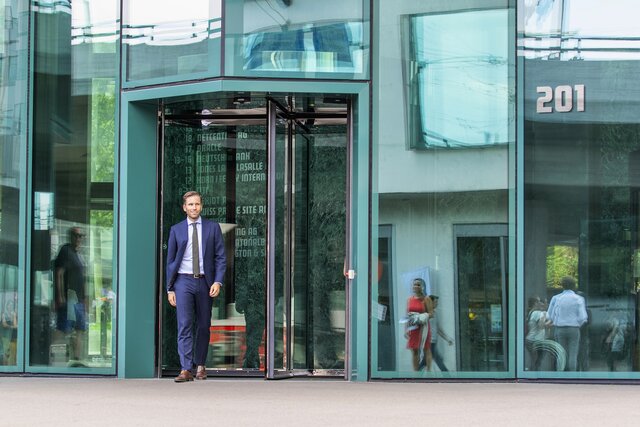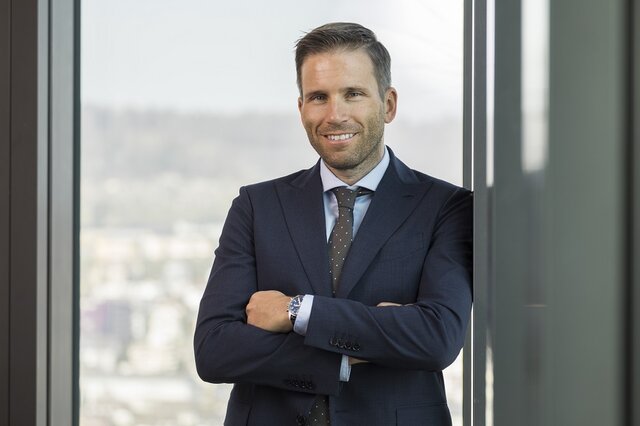
In Switzerland, investing in real estate has traditionally been seen as a safe bet. But does this still hold true in 2023? And what challenges does the real estate sector face in the medium to long term? Keen to find out, «Fokus» spoke to Anastasius Tschopp, CEO of Swiss Prime Site Solutions.
Mr Tschopp, you have been at the helm of Swiss Prime Site Solutions (SPSS) as CEO since 2018. How has the market in which you operate changed during this time?
As with most other areas of life and work, the real estate market has undergone a transformation in recent years, particularly in the period during the Covid pandemic. Interestingly – and contrary to the assumptions of many market participants at the time – vacancy rates are now at record low levels. The interest rate pivot was a major issue, of course, especially in our sector. But it’s not just the market that has changed – we have also changed as a company in recent years.
What have these changes been specifically?
A few years ago, our team consisted of just a handful of experts who collectively managed CHF 1.4 billion in assets. Today, SPSS boasts a team of more than 80 professionals overseeing assets of more than CHF 8 billion. Our broad expertise is a major plus in this regard. In addition to investment experts, our team also includes professionals with backgrounds in real estate development, owner representation and transactions. This is what enables us to offer the full spectrum of real estate-related services and expertise from a single source.
The media keeps warning of a real estate bubble that’s about to burst.
Yet the Swiss real estate market has proved to be stable despite the interest rate pivot, the pandemic and geopolitical conflict. We expect this to continue, which is why investing in real estate remains a very attractive proposition. When we look at the market for residential and commercial buildings, we can see that vacancy rates are extremely low. At the same time, space is becoming increasingly scarce here in Switzerland. Thus, it’s not too hard to conclude that the lack of space is driving up demand, which in turn is keeping the real estate sector fundamentally stable. This situation is not expected to change much, in part because of bureaucratic factors.
What do you mean by that?
Just 8% of Switzerland’s land area is zoned for construction. This is not much at all, particularly in view of the population growth. We therefore need to have a more serious discussion about densification in Switzerland. Some exciting solutions could emerge here. For instance, with timber buildings, we could promote sustainable densification and simultaneously drive the construction of social housing. However, this would require stronger support at the political level, which I do not really see at the moment.
How exactly might your company contribute to greater densification?
At SPSS, we focus exclusively on real estate. Thanks to our broad expertise in this field, we are able to handle tasks such as property development and owner representation in-house. If the risk-return profile is positive, this means we can occasionally explore new avenues and promote aspects such as sustainability more strongly. We also don’t shy away from adding properties to our portfolio that still need some development work or refinement. This is precisely what we mean by «portfolio management». We want and need to be proactive and renovate the properties in the portfolio, enable their conversion and thus align with the principles of sustainability and densification. An example of how this can look in practice is the «Riverside» area in Zuchwil, which is managed by us and was previously part of the industrial zone. We pushed for the upzoning and rezoning of this area and can now build several hundred properties on it. Projects such as these call for expertise and time: in this particular case, we started tapping into the potential of the site 10 years ago. After all, the success of such initiatives also depends on being able to anticipate future developments.
Speaking of anticipation, what characterises a sustainable investment strategy that ensures diversification and growth in an ever-evolving market?
We have a variety of different products – from investment foundations to a commercial fund [SPSS Investment Fund Commercial] and a mixed fund [Akara Diversity PK], through to mandates, club deals and closed-end funds with a fixed investment horizon. Our funds are not listed, and we sometimes opt for anti-cyclical investments. The products we create vary in the sense that some are composed entirely of commercial properties, while others include a mix of residential and commercial buildings. Of course, a portfolio made up solely of commercial properties will have a different risk allocation than a mixed portfolio. Our products are spread throughout the whole of Switzerland, which in itself contributes towards diversification. At the same time, the real estate products offer good protection against inflation.

You keep mentioning sustainability, which is becoming an increasingly important focus in the real estate industry. How does Swiss Prime Site Solutions integrate sustainable practices into its operating and development strategies?
ESG criteria are key considerations in everything we do. We are guided by the 2050 climate goals, which serve as a key benchmark for us. We also actively pursue a «managed to green» approach, which involves proactively identifying and maximising the sustainability potential of the managed properties. For example, when an opportunity arises to replace an oil heating system in a building, this should be done at the most appropriate time. Similarly, «sustainability» in our industry should not be limited to the environmental aspect alone – the social component should also be taken into account. In this sense, I see an opportunity to create not only ecological but also social added value through densification. An important prerequisite for this would be a simplified building permit process and more flexibility in terms of use, which would also support the construction of social housing. Furthermore, as real estate professionals, we are called on to devise concepts that facilitate independent living in old age, which is a pressing generational issue. Last but not least, we at SPSS have a responsibility to generate stable, reliable and sustainable returns with the pension fund assets entrusted to us.
What do you see as the main challenges for the real estate industry in the near future?
Ensuring sufficient space for an ever-growing population is likely to be a key challenge, considering the constraints of the current infrastructure, which is intertwined with Switzerland’s building stock and vice versa. We need to become more flexible, which requires political will. As already mentioned, there is still room for improvement here.
«Just 8% of Switzerland's land area is zoned for construction. »

What do you see as the main challenges for the real estate industry in the near future?
Ensuring sufficient space for an ever-growing population is likely to be a key challenge, considering the constraints of the current infrastructure, which is intertwined with Switzerland’s building stock and vice versa. We need to become more flexible, which requires political will. As already mentioned, there is still room for improvement here.
The real estate industry is seen as relatively slow to embrace digitalisation. How is SPSS leveraging the opportunities presented by digital technology?
For our management activities, we use tools such as asset management cockpits, which give us a constant overview of the condition of our properties, as well as information about vacancies, expiring rental contracts, ESG compliance, reduction pathways and other aspects. This ensures maximum transparency and enables us to work efficiently. In addition, we have quick access to current benchmark data, which, in conjunction with geospatial data, helps us to determine the rent level for a property in a specific region.
What is your vision for Swiss Prime Site Solutions for the next five to 10 years?
That’s quite a long time, both for an asset manager and a CEO [laughs]. One of our goals is undoubtedly to increase our assets under management into the double-digit billion range. This will provide us with the necessary basis to establish new products in future. Preserving our independence as a real estate asset manager is another key priority for me. For its work to be meaningful, a company must have a compelling «why». As asset managers, we are lucky, because our primary purpose is clear: to invest and grow these funds responsibly for our clients – today, tomorrow and beyond.